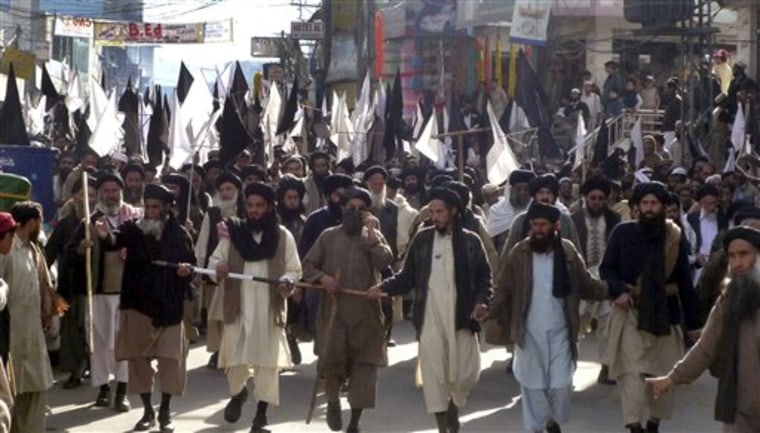A hard-line cleric sought Thursday to convince the Taliban to disarm under a pact with Pakistan's government that has been criticized at home and abroad as giving into militants ravaging the country's northwest, a militant spokesman said.
Monday's deal allows for the imposition of Islamic law in the former tourist resort of Swat and surrounding districts in exchange for an end to a brutal insurgency that has killed hundreds and sent up to 1/3 of its 1.5 million people fleeing.
A similar deal in Swat last year collapsed in a few months and was blamed for giving insurgents time to regroup.
The cleric, Sufi Muhammad, met with Swat Valley Taliban leader Maulana Fazlullah in an undisclosed location, Taliban spokesman said Muslim Khan. Fazlullah is the son-in-law of Muhammad, an Islamist leader once imprisoned but who has since publicly renounced violence.
"They are discussing how to ensure peace and how to ensure the provision of speedy justice" to the people, he said.
On Tuesday, a Pakistani TV reporter who had been covering a peace march by Muhammad and his supporters was shot and killed. Authorities have not speculated about who was behind the killing of Musa Khan Khel, 28, and neither has his employer, Geo TV.
Khan condemned the killing, saying the whoever did it wanted to "to derail the peace process."
Giving in to the Taliban?
Over the last 18 months, militants have routed the police, beheaded political opponents and burned scores of schools for girls in the Swat Valley, which lies next to Pakistan's tribal regions close to the Afghan border, where Taliban and al-Qaida militants have long held sway.
Pakistani officials insist the deal is not a concession, but rather that it addresses the long-standing demands of residents in Swat and surrounding areas for a more efficient justice system. They say the laws will not be implemented until the militants have disarmed.
The main changes would involve already existing regulations that were never enforced, for instance, allowing religious scholars to advise judges, officials said. They say the laws will not ban girls from schooling or introduce other hard-line measures, as some Taliban fighters would want.
But many critics say the deal effectively means ceding the region to the Taliban and fear it will embolden other militant groups challenging Pakistan's shaky secular government. NATO has said warned it risks creating a "safe haven" and Britain has also expressed concern.
The United States has not directly criticized the deal, saying it needs more time to understand its implications.
The U.S. response has been seen as a sign the new administration is wary about weakening an already fragile Pakistani government that Washington needs to help fight Islamic militants using Pakistan to stage attacks on U.S.-led forces in Afghanistan.
Some 2,000 militants are believed to operate in the valley. In defiance of some 10,000 paramilitary and army troops, they have already set up their own courts, meting out punishments in line with an exceptionally harsh brand of Islamic law.
